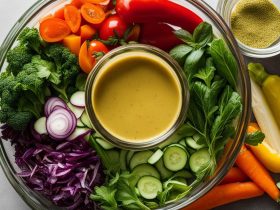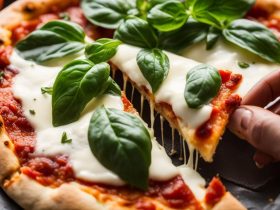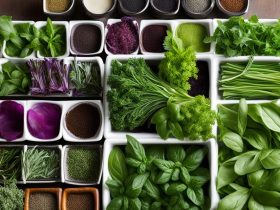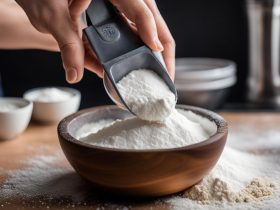Baking is a precise science that requires accurate measurement of ingredients to achieve consistent and professional-quality results. Eyeballing or guessing the amounts may lead to unpredictable outcomes as baking relies on specific chemical reactions between ingredients. The right ratios are crucial for achieving the desired texture and taste in your baked goods.
Using a kitchen scale is a valuable tool for accurate measurements, as it eliminates guesswork and allows for precise ingredient ratios. While measuring cups and spoons play a role in accurate ingredient measurement, they may not be as precise as a scale. Weighing dry ingredients and using liquid measuring cups for liquids can help ensure accuracy in your baking.
To enhance your baking skills and elevate your creations, it is important to understand the significance of accurate ingredient measurement and follow tips and techniques to achieve precise results. Let’s explore the importance of accurate ingredient measurement in baking and learn how to measure ingredients accurately.
Key Takeaways:
- Accurate ingredient measurement is essential in baking to ensure consistent and professional-quality results.
- Baking is a science that relies on specific chemical reactions, requiring precise ingredient ratios.
- A kitchen scale is a valuable tool for accurate measurements, eliminating guesswork and allowing for precise ingredient ratios.
- Measuring cups and spoons play a role in accurate ingredient measurement but may not provide the same level of precision as a scale.
- Following tips and techniques for accurate ingredient measurement can help enhance your baking skills and achieve optimal results.
Baking as a Science: The Importance of Precision
Baking is not just an art; it is a science that requires precision in every step. From measuring ingredients to following specific techniques, precision plays a vital role in achieving consistent and successful results. Unlike cooking, where you can adjust ingredients to taste, baking depends on precise measurements to ensure the right chemical reactions occur.
The significance of precision
The significance of precision is evident in the ingredient ratios used in baking. Adding too much or too little of an ingredient can have a significant impact on the final outcome. It can affect the texture, structure, and taste of your baked goods. Whether you’re making fluffy cakes, flaky pastries, or chewy cookies, getting the ingredient ratios right is crucial for achieving professional-quality results.
Imagine baking a cake without accurately measuring the flour, sugar, or leavening agents. The result could be a dense and deflated cake that lacks the desired lightness and rise. On the other hand, precise measurement of ingredients can lead to a perfectly moist and tender cake with just the right amount of sweetness.
Using a kitchen scale
Using a kitchen scale is one tool that can help you achieve precision in ingredient ratios. By weighing ingredients instead of relying solely on volume measurements, you can ensure consistent results, as the density of ingredients can vary. A kitchen scale eliminates the guesswork and allows for accurate measurements, which are essential for achieving the desired texture and taste in baked goods.
While measuring cups and spoons also play a role in accurate ingredient measurement, it’s important to note that they may not provide the same level of precision as a scale. Measuring cups are designed for volume measurements and may result in discrepancies when measuring certain ingredients like flour, which can easily become compacted.
precision in baking
Overall, precision in baking is crucial for achieving consistent and professional-quality results. By understanding the science behind baking and meticulously measuring your ingredients, you can elevate your baking skills and create delicious treats that are sure to impress.
| Benefits of Precision in Baking |
|---|
| Precise ingredient ratios for consistent results |
| Optimal texture and structure in baked goods |
| Enhanced taste and flavor |
| Professional-quality results |
| Avoidance of baking mishaps and disappointments |
The Role of a Kitchen Scale in Accurate Ingredient Measurement
A kitchen scale plays a crucial role in achieving accurate ingredient measurement in baking. It eliminates guesswork and provides precise measurements, ensuring consistent results in your baked goods. By using weight measurements instead of volume, you can achieve precise ingredient ratios, resulting in the desired texture and taste in your creations.
Unlike measuring cups and spoons, which rely on volume, a kitchen scale allows you to measure ingredients based on their weight. This is especially important because the density of ingredients can vary. By using a kitchen scale, you can account for these differences and maintain accuracy in your recipes.
When it comes to achieving the perfect texture and taste in your baked goods, precise ingredient ratios are key. Whether you’re measuring dry ingredients like flour and sugar or liquids such as milk and oil, a kitchen scale ensures your ratios are spot on.
Not only can a kitchen scale measure larger quantities accurately, but it also excels at measuring smaller quantities with precision. This is particularly useful when dealing with delicate ingredients or recipes that require precise measurements. With a kitchen scale, you can confidently measure even the smallest quantities for optimal results.
Using a kitchen scale in your baking endeavors not only enhances the accuracy of your measurements but also streamlines your baking process. No more worrying about converting measurements or dealing with the inconsistencies of volumetric measurements. With a kitchen scale, you can bake with confidence, knowing that your ingredients are accurately measured.
By incorporating a kitchen scale into your baking routine, you’re taking a step toward elevating your skills and achieving professional-quality results. So, whether you’re a seasoned baker or just starting out, investing in a kitchen scale is a smart choice that will enhance your baking experience.
Measuring Cups and Kitchen Scales: The Difference
When it comes to ingredient measurement in baking, two essential tools are commonly used: measuring cups and kitchen scales. While both serve the purpose of ensuring accurate measurements, they differ in their approach.
Measuring Cups:
Measuring cups are typically used to measure ingredients by volume. They come in various sizes and are designed to hold specific amounts of ingredients. Measuring cups are suitable for both dry and liquid ingredients, making them versatile in the kitchen. However, it’s important to note that using measuring cups may not provide the same level of accuracy as a kitchen scale.
Kitchen Scales:
Kitchen scales, on the other hand, measure ingredients by weight. They provide a more accurate measurement, especially when it comes to achieving precise ingredient ratios. By using a kitchen scale, you can weigh your ingredients and ensure consistency in your baking. This is particularly beneficial when working with delicate recipes or when precision is crucial for achieving professional-quality outcomes.
When to Use Measuring Cups vs Kitchen Scales:
The choice between using measuring cups or a kitchen scale depends on the recipe and the desired level of accuracy. Measuring cups can be used for recipes where precise measurements are not critical, such as certain cake batters or cookie doughs. However, when it comes to delicate pastry recipes, bread making, or working with specialty flours, using a kitchen scale can help ensure consistent results and enhance the overall quality of your baked goods.
By understanding the difference between measuring cups and kitchen scales, you can choose the right tool for specific recipes and achieve the level of accuracy required for a successful bake. Whether you opt for measuring cups or a kitchen scale, remember that accurate ingredient measurement is key to achieving consistent and professional-quality results in your baking adventures.
Tips for Accurate Ingredient Measurement in Baking
Accurate ingredient measurement is crucial for achieving consistent and delicious results in baking. To ensure precision in your measurements, here are some valuable tips and techniques:
-
Use the appropriate measuring tools:
Different ingredients require different measuring tools. Use dry measuring cups for dry ingredients and liquid measuring cups for liquids. This will help you achieve accurate measurements and maintain the right balance in your recipes.
-
Utilize a kitchen scale:
Weight measurements provide the most precise results. Investing in a kitchen scale will allow you to measure your ingredients accurately and ensure consistent outcomes. Weight measurements are especially beneficial for dry ingredients.
-
Follow recipe instructions closely:
Pay careful attention to the specific measurements mentioned in your recipe. Even a slight deviation can affect the final outcome. Be diligent in measuring the ingredients exactly as directed.
-
Level off dry ingredients:
When using measuring cups for dry ingredients, use the back of a knife or a straight edge to level off the excess. This will ensure that you are using the exact amount specified in the recipe.
-
Understand ingredient density:
Different ingredients have different densities, which can affect measurements. For instance, sifted flour will be lighter than unsifted flour. Understanding these differences will help you make accurate measurements and produce consistent results.
-
Properly fill and measure ingredients:
Fill your measuring cups and spoons by spooning the ingredient into them and leveling off the excess. Avoid packing ingredients down or shaking the cup to settle them as this can lead to inaccurate measurements.
-
Take your time:
Accurate ingredient measurement requires patience and attention to detail. Avoid rushing through the process and give each measurement the time it deserves. The extra effort will be reflected in the quality of your baked goods.
By following these tips and techniques, you can ensure precise ingredient measurement in your baking endeavors. Accurate measurements will help you achieve consistent, professional-quality results that will impress both yourself and others.
The Impact of Accurate Ingredient Measurement on Baked Goods
Accurate ingredient measurement plays a crucial role in the success of your baked goods. By measuring your ingredients precisely, you can achieve consistent results that are sure to impress. The benefits of precise measurements in baking go beyond just the final product – they also impact the overall baking experience. Let’s delve into the various ways accurate ingredient measurement can make a difference.
Consistent Results from Batch to Batch
When you measure your ingredients accurately, you ensure that each batch of your baked goods turns out the same way. Whether you’re making cookies, cakes, or bread, precise measurements help maintain the balance of flavors, textures, and structures. Consistency is key, especially if you’re baking for a business or looking to hone your skills as a home baker.
Texture, Structure, and Taste
The texture, structure, and taste of your baked goods depend on the proper ratios of ingredients. Measuring ingredients accurately allows you to achieve the desired outcome and avoid common baking mishaps. For example, measuring your leavening agents – such as baking powder or yeast – accurately ensures proper rising and avoids collapsed cakes or dense bread.
Preventing Baking Issues
Accurate ingredient measurement can help prevent a range of baking issues. Over or under-measuring certain ingredients can cause cookies to spread too much, cakes to sink in the middle, or a recipe to taste off. Avoid these disappointments by embracing precise measurements in your baking routine.
“Accurate ingredient measurement is the secret to consistent, delicious results in baking.”
By achieving accurate ingredient measurement, you can elevate your baking to new heights. Professional-quality results are within reach when you pay attention to the details. Whether you’re a seasoned baker or just starting out, precise measurements will enhance your skills and the overall enjoyment of your baked treats.
The Role of Measuring Tools in Accurate Ingredient Measurement
Using the right measuring tools is crucial for achieving accurate ingredient measurement in baking. Properly measuring ingredients ensures that your baked goods turn out consistently delicious. Let’s take a closer look at the role of measuring tools in achieving precise ingredient ratios.
When it comes to measuring dry ingredients, dry measuring cups are your go-to tool. These cups are specifically designed to measure dry ingredients such as flour, sugar, and cocoa powder. The flat, level top allows for an accurate measurement, ensuring that you add just the right amount to your recipe.
In contrast, liquid measuring cups are ideal for measuring liquids such as milk, water, and oil. These cups have a pour spout and clear markings that make it easy to measure liquids accurately. It’s important to note that liquid and dry measuring cups are not interchangeable, as they measure ingredients differently.
For small measurements, measuring spoons are the perfect tool. These spoons come in various sizes, including teaspoons and tablespoons, allowing you to accurately measure small quantities of ingredients such as baking powder, vanilla extract, or salt.

By using the appropriate measuring tools for each ingredient, you can achieve precise ingredient ratios. This is important because accurate measurements help maintain the structural integrity and flavor balance of your baked goods.
Next, let’s explore some tips and techniques to ensure accurate measurement of dry ingredients.
Overcoming Challenges in Measuring Dry Ingredients
Accurately measuring dry ingredients can pose challenges due to their nature. Ingredients like flour or confectioner’s sugar have a tendency to become packed down, leading to inconsistent measurements. Fortunately, there are tips and techniques you can use to overcome these challenges and ensure accurate measurements.
Tips for Measuring Dry Ingredients Accurately:
- Fluff or Sift: Before measuring, fluff or sift dry ingredients such as flour or powdered sugar. This helps break up any clumps and ensures a consistent and accurate measurement.
- Weigh Instead of Volume: While measuring cups are commonly used for dry ingredients, they may not provide the same level of accuracy as weighing with a kitchen scale. Using a scale allows for precise measurements, especially when dealing with dense or compact ingredients.
By incorporating these tips into your baking routine, you can overcome the challenges associated with measuring dry ingredients and achieve consistent and accurate results.
| Challenges in Measuring Dry Ingredients | Tips for Measuring Dry Ingredients Accurately |
|---|---|
| Dry ingredients can become packed down, leading to inconsistent measurements. | Fluff or sift dry ingredients before measuring. |
| Using volume measurements with measuring cups may not provide the same level of accuracy. | Weigh dry ingredients with a kitchen scale for precise measurements. |
Ensuring Accurate Measurement of Liquid Ingredients
Measuring liquid ingredients accurately is a crucial aspect of successful baking. However, it can present its own set of challenges. Whether you’re dealing with water, milk, or oil, it is essential to measure liquids correctly to achieve the desired results in your baked goods.
To ensure accurate measurement of liquid ingredients, there are several tips and techniques you can follow:
- Use Pouring Spout and Graduated Liquid Measuring Cups: When measuring liquids, it is recommended to use pouring spout and graduated liquid measuring cups. These specialized cups have clear markings that make it easier to read the measurements without any guesswork. They also feature a pouring spout for easy, mess-free pouring.
- Pay Attention to the Meniscus Line: The meniscus line refers to the slight rise of liquid along the edge of the measuring cup caused by surface tension. To measure liquids accurately, hold the measuring cup at eye level and align the lowest point of the meniscus line with the desired measurement. This ensures precise liquid measurement.
- <strong>Invest in High-Quality Liquid Measuring Cups:</strong> Using high-quality liquid measuring cups is essential for accurate measurement. These cups are designed to provide precise measurements and are made from durable materials that won’t warp or distort over time. Investing in quality measuring cups ensures reliable results.
By following these tips and techniques, you can overcome challenges in measuring liquid ingredients and achieve precise results in your baking endeavors.
Image:
The Importance of Small Baking Measurements
In the world of baking, precision is key. While larger measurements often take center stage, small baking measurements play an equally crucial role in achieving perfect results. Whether you’re adding a teaspoon of vanilla extract or a tablespoon of baking powder, <b>accurate measuring of small quantities ensures the desired taste, texture, and consistency in your baked goods.
When it comes to measuring small quantities, using high-quality measuring spoons made of metal is essential. These spoons provide the accuracy and consistency needed to achieve precise ingredient measurements. Unlike plastic spoons, metal measuring spoons do not warp or bend, allowing for precise leveling and accurate results every time.
Before measuring with spoons, it’s important to take a moment to stir and fluff your dry ingredients. This simple step helps remove any clumps, ensuring an even distribution and accurate measurement of your small quantities. By breaking up any lumps in ingredients like flour or cocoa powder, you can achieve a more accurate measurement and prevent any potential weighing errors.
Small ingredient measurements may seem insignificant, but they have a significant impact on the overall success and quality of your baked goods. Precise measurements ensure that each component of your recipe is in balance, contributing to the perfect rise, texture, and flavor. By paying attention to even the smallest of measurements, you can elevate your baking skills and create consistently delicious treats.
In the realm of baking, every detail matters. From precise ingredient measurements to careful execution, the art of baking requires patience and precision. By mastering the art of small baking measurements, you can unlock endless possibilities in the creation of delectable treats.
Professional Baking and Accurate Ingredient Measurement
In a professional baking environment, accuracy in ingredient measurement is paramount. Commercial bakeries prioritize consistent results and high-quality products to satisfy their customers. The benefits of precise ingredient measurement in professional baking are numerous.
Accurate measurements ensure that every batch of baked goods meets the desired standards. Whether it’s a delicate pastry or a delectable cake, precise ingredient ratios are integral to achieving the desired texture, taste, and appearance. By focusing on accuracy in ingredient measurement, professional bakers can consistently deliver exceptional products and maintain a reputation for excellence.
| Benefits of Accurate Ingredient Measurement in Professional Baking |
|---|
| 1. Consistent results |
| 2. High-quality products |
| 3. Customer satisfaction |
| 4. Desired texture, taste, and appearance |
| 5. Excellence in baking |
Conclusion
Accurate ingredient measurement is crucial for achieving consistent results and perfecting your baking skills. With precise measurements, you can ensure the right ratios of ingredients, resulting in optimal texture, taste, and appearance in your baked goods. Whether you prefer using measuring cups, measuring spoons, or a kitchen scale, it’s important to follow proper techniques and select the appropriate tools for each ingredient.
By paying attention to detail and embracing accurate ingredient measurement, you can unlock the true potential of your baking. Consistency is key in delivering professional-quality treats that will delight both yourself and others. Remember, baking is a science, and accurate measurements serve as the foundation for achieving the desired outcomes. Take the time to measure your ingredients accurately and enjoy the rewards of consistent, delicious results.
So, whether you’re a novice baker or an experienced pastry chef, remember the significance of precise ingredient measurement in baking. Elevate your skills, create beautiful confections, and satisfy your taste buds with the perfect balance of flavors. Make accurate ingredient measurement a cornerstone of your baking journey, and savor the incredible results it brings to your recipes.
FAQ
Why is accurate ingredient measurement important in baking?
Accurate ingredient measurement is important in baking because it ensures consistent results and optimal texture and taste in baked goods. Precise ratios of ingredients are crucial for achieving the desired outcomes.
What role does a kitchen scale play in accurate ingredient measurement?
A kitchen scale is a valuable tool for accurate ingredient measurement in baking. It eliminates guesswork and allows for precise measurements, helping achieve the desired texture and taste in baked goods.
What is the difference between measuring cups and kitchen scales?
Measuring cups measure ingredients by volume, while kitchen scales measure ingredients by weight. Measuring cups can be used for both dry and liquid ingredients, but kitchen scales provide more precise measurements.
Are there any tips for accurate ingredient measurement in baking?
Yes, some tips include using the appropriate measuring tools for each ingredient, following recipe instructions closely, and using leveling techniques for dry ingredients in measuring cups.
What is the impact of accurate ingredient measurement on baked goods?
Accurate ingredient measurement ensures consistent results and enhances the overall quality of baked goods. It contributes to achieving the desired texture, structure, and taste.
What is the role of measuring tools in accurate ingredient measurement?
Measuring tools such as measuring cups, spoons, and kitchen scales play a crucial role in accurate ingredient measurement. They help achieve precise ingredient ratios, resulting in consistent and successful bakes.
How can I overcome challenges in measuring dry ingredients?
To overcome challenges in measuring dry ingredients, you can fluff or sift them before measuring. Using a kitchen scale instead of relying solely on volume measurements can also provide more precise results.
How can I ensure accurate measurement of liquid ingredients?
It’s important to use pour spout and graduated liquid measuring cups for liquid ingredients. Pay attention to the meniscus line and align the lowest point with the desired measurement for accurate liquid measurement.
What is the importance of small baking measurements?
Small baking measurements, such as teaspoons and tablespoons, contribute to the overall success and quality of baked goods. Using high-quality measuring spoons and proper techniques ensures accuracy in small ingredient measurements.
Why is accurate ingredient measurement crucial in professional baking?
In professional baking, accurate ingredient measurement is crucial for achieving consistent results and maintaining high-quality standards. It helps ensure customer satisfaction and a reputation for excellence.
Why should we emphasize accurate ingredient measuring in baking?
Accurate ingredient measurement is essential for achieving professional-quality results in baking. It enhances the science of baking, where precise ratios of ingredients drive chemical reactions and contribute to the desired outcomes.
Related Articles
- Fresh Herbs in Cooking: Unveil Their Benefits
- Accurate Measuring in Baking: Why It’s Key
- Homemade Pizza Guide: Step-by-Step Process Explained
- Easy Homemade Salad Dressing Guide












Leave a Reply